There are only two kinds of musicians in the world. Which are you? Which would you rather be? Let's find out.
Let me explain what I mean. I have been trying for some time to get a little band together just for fun. I really do prefer my solo show but there is something very cool about being part of a sound that comes from a really tight band, and a lot of the songs I write are not really meant for just guitar. Anyway, in the course of auditioning artists, I am reminded of exactly what the difference is between the two types of musician.
Let's shallowly label them, shall we? For the sake of this argument let's call them "Jammers" and "Players." As you will see, these are quite descriptive terms and a hint at what the differences are.
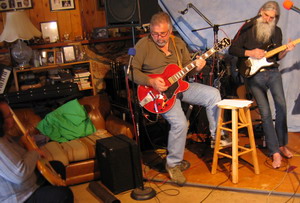 There are a lot of reasons why a musician is not a good fit for a particular band. The player may audition for a rock band but he plays country riffs. He may audition and find his house is too far away from the practice space. Maybe he slept with the drummer's girlfriend or can't go on the road because he wears an ankle bracelet. Perhaps he's better than you and finds your setlist boring, or perhaps he just can't learn your book.
There are a lot of reasons why a musician is not a good fit for a particular band. The player may audition for a rock band but he plays country riffs. He may audition and find his house is too far away from the practice space. Maybe he slept with the drummer's girlfriend or can't go on the road because he wears an ankle bracelet. Perhaps he's better than you and finds your setlist boring, or perhaps he just can't learn your book.
Whatever the reasons, the fundamental fact remains that it is a rare and magical moment when the right humans get in a room, start playing and "it works." The planets align, the clouds part, the sun shines through and BAM! A bond is formed and the grapes become a bunch. In that moment, there is a marriage of sounds, a melding of hearts, a meeting in the middle to form a single entity with the influence of the energy and life experience of the component members.
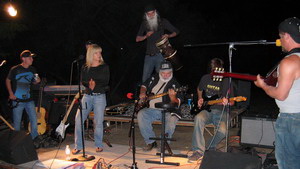 Until that moment there are years of mismatches, searching, perhaps playing below your skill level just to play something. There are inevitable attempts at forcing it to happen, wasting months in a situation that you know in your heart isn't going to work. It shouldn't be "easy" and you'll know right away if it's a fit. Don't waste too much time trying to make it into something it isn't.
Until that moment there are years of mismatches, searching, perhaps playing below your skill level just to play something. There are inevitable attempts at forcing it to happen, wasting months in a situation that you know in your heart isn't going to work. It shouldn't be "easy" and you'll know right away if it's a fit. Don't waste too much time trying to make it into something it isn't.
Sounds like a Cosmo piece on relationships, doesn't it? So far...
So what's the problem? There are only 12 notes, we all know them, we can all count to 4 and have heard this song thousands of times on the radio. Why doesn't it sound good even after we play it together 100 times? It's ok, but it isn't the Beatles.
Part of the problem may be that no one can really capture the original emotions of the author of a song, they can only lend their interpretation to it. If you didn't write the song, it's a cover dude, even if your bandmate wrote it.
What I have found while auditioning a bunch of musicians lately is that, although they're fun to jam with, Jammers are really frustrating to play with. I also found that Players that might be a match are few and far between. So, what is the difference? Why can a Player jam but a Jammer can't play? I'll tell you.
The difference is: a Jammer plays along and a Player plays the song.
The Jammer is almost always just a little bit late. It may be just a hair, but late nonetheless. The reason being they don't know the song and they are forced to react to what you play. A good Jammer is fun to play with because they can anticipate what you are going to do next. The Jammer never plays the same song twice. A Player plays the song many different ways. A fine line, isn't it? It's kind of hard to describe.
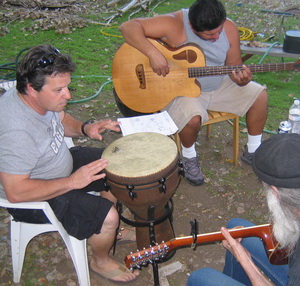 A Player invests in the song. Sometimes he digs deep into a personal experience to relate to the words or the flavor of the song, to deliver the message of the song with a feeling he believes the author intended, through emotion and articulation as well as, hopefully, all the right notes. Even if the "message" is somehow changed by the Player's current skill set or emotional state, the song gets delivered by the Player as he believes it was authored. Occasionally magic happens and a Jammer will hit it just right and nail it, make it his own that night, for that show.
A Player invests in the song. Sometimes he digs deep into a personal experience to relate to the words or the flavor of the song, to deliver the message of the song with a feeling he believes the author intended, through emotion and articulation as well as, hopefully, all the right notes. Even if the "message" is somehow changed by the Player's current skill set or emotional state, the song gets delivered by the Player as he believes it was authored. Occasionally magic happens and a Jammer will hit it just right and nail it, make it his own that night, for that show.
Once in a while a Player makes a song his own and you, the listener, may get a totally different meaning or feeling of the song as "covered." Different from the original, personalized by the Player, he may own it every time he plays it and will pretty much play it the same way every time. When a Jammer plays a cover, it is a whole different kettle of fish. A Jammer will rarely play the song the same way twice. That's the whole point of jamming, right? Nothing wrong with that. A good Jammer who "plays" the song can make it great and different, fresh every time.
Now don't get me wrong, I'm not saying that one or the other is bad or good or better or worse. There are some amazing jam bands and, when you see them perform, you hope that it's "gonna be different." When all five guys are playing off the theme in five different ways, it's a treat for your soul. Similarly, when five guys who have figured out their parts, rehearsed and rehearsed and perfected and rehearsed some more, finally bring that song to the stage it is like listening to a CD. Not a missed note or timing error, it is a perfect blending of individual sounds that make up a whole. When they can do all that work and manipulate our senses and still feel the emotion of the song then, again, we are touched deeply.
Harmony, that's what it's all about. Sometimes what you need is a happy blend of the two. A virtuoso keyboardist may be both a Player and a Jammer and what she needs is a tight band of Players to lay down a rock-solid rhythm that follows her emotional performance. Able to play with her wherever she may go, hitting the ones no matter what, keeping her on track, yet free to roam, they follow the song structure to the letter, providing the time frame that, when played consistently from show to show, allows the soloist the freedom to wander from the theme, always having a convenient landing zone to resolve to. The greatest untold stories of the truly great solos of the world are the people that played the backline for it.
So which do you want to be?
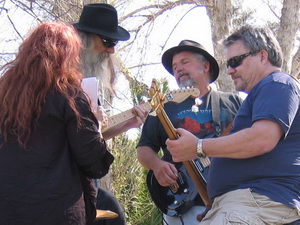 I want to be both. I want to woodshed my studio songs 'til they are perfect and, damn it, I want a rock-solid backline that plays exactly what I want and I won't settle for less. I also want those people to be able to "take it" and take it good, fully expecting to be rock-solid behind them.
I want to be both. I want to woodshed my studio songs 'til they are perfect and, damn it, I want a rock-solid backline that plays exactly what I want and I won't settle for less. I also want those people to be able to "take it" and take it good, fully expecting to be rock-solid behind them.
I want to go to random blues jams in dive bars and play with the beer-belly guys that played with some no-name spandex band in the 80s and will never be in another band again as long as he lives. Some of those guys are the most amazing guitar players you will never hear.
On the other hand, I have known some amazing players who can't jam a lick. Without a score in front of them they are lost. I met a young piano player years ago. He had the most amazing touch. He played at a church and would perform the great classical masters' songs in a way that had the angels weeping. He knew everything there was to know about musical theory, all the scales and the chords, and with a moment's glance through, could play any piece of music you set in front of him exactly as written. Perfect timing; it was astounding. He was an amazing talent, until you took away the paperwork.
We met when I was recording my first album ("Just a Seedling," out of print) in the church where he performed, and I wanted him to play on it. When I asked him to write a piano part for a song, though, he had to admit he had no idea what to do. We eventually figured something out and it sounded ok, but it was different than it would have been if I'd been able to write the part and then have him play it. It was humbling for both of us. We vowed to be better musicians and I hope he kept it up. It would be a shame if the world didn't get to hear him play. As for me, I could sit down at a piano and write that part now. I am ashamed to say, however, that it's been so long since I "read" music, if you put a piece of sheet music in front of me I doubt I would play it right on the first try.
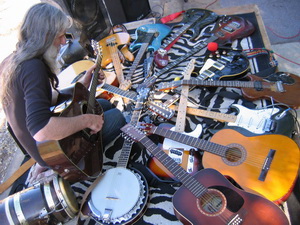 There are lots of musicians in the world but there are really only two types: Jammers and Players. It is a delightful thing to mix and match but the best bands in the world are made up of Players who can jam, not Jammers that can play. It takes an investment, not just in emotion but in technique and professionalism. It takes an understanding of how you fit into the big picture. It takes a dedication to your craft. It takes a commitment with yourself to keep learning and improving and practicing and rehearsing and keeping your ego in check and finding the balance between pure technique and pure emotion.
There are lots of musicians in the world but there are really only two types: Jammers and Players. It is a delightful thing to mix and match but the best bands in the world are made up of Players who can jam, not Jammers that can play. It takes an investment, not just in emotion but in technique and professionalism. It takes an understanding of how you fit into the big picture. It takes a dedication to your craft. It takes a commitment with yourself to keep learning and improving and practicing and rehearsing and keeping your ego in check and finding the balance between pure technique and pure emotion.
Harmony is the key. It takes harmony of notes, harmony of personalities, harmony of energy and emotion, spirituality and reality. It demands the kind of harmony that blends all your hard work, your creative flow and your emotions into your songs - your heart, your mind and your middle. It takes all three.
